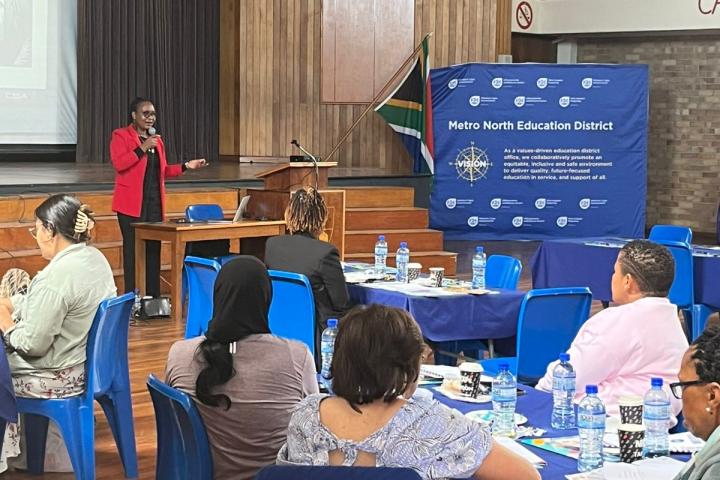Embedding Cyber Wellness into Pedagogy to Build Resilient Classrooms

On 1 November 2025, the Metro North Education District hosted a Cyber Wellness Workshop at Saffier Primary School, bringing together educators, researchers, and practitioners to explore how digital safety, pedagogy, and innovation can be embedded into teaching practice.
It was such an honour and pleasure for us at the Cybersecurity Capacity Centre for Southern Africa (C3SA) to present our NRF-funded Cy4MaS project (Cybersecurity for Marginalised Schools). Dr Caroline presented on behalf of C3SA, sharing insights from this initiative, led by the University of Cape Town, which is designed to empower rural and disadvantaged schools with practical, community-led cybersecurity protection. The project forms part of UCT's broader vision for a Cyber Resilient Africa, and we were proud to share its progress and impact with fellow educators and stakeholders at this important gathering.
Embedding Cyber Wellness into Life Orientation
A key focus of the workshop was the integration of cyber wellness into the Life Orientation (LO) curriculum. The day featured powerful presentations from speakers including Gafieza Ismail on Cyber Wellness, Kauther Gallow on the use of Artificial Intelligence for Lesson Planning, Jaycee Van Willingh and Hagan Horne on Cyber Wellness Practical Strategies, and Carizke Van Niekerk on developing Digital Footprint awareness.
Presentations highlighted that cyber wellness is inseparable from digital law. Educators were reminded of their duty of care in cases of cyber-attacks on learners, such as cyberbullying, the legal implications of learners' online behaviour, and the importance of guiding students to understand their digital footprint.
Pedagogy and Practical Strategies
Speakers shared practical approaches for building digital resilience among learners:
Develop digital literacy and critical thinking skills.
Support emotional well-being and promote healthy online behaviour.
Discuss differences between the real world and the digital world.
Apply WCED values to online behaviour.
Empower learners as digital citizens.
The session wrapped up with a powerful call to action: #BeTheInfluencer – encouraging educators to model positive digital citizenship and become the influencers who shape healthy online behaviour in their classrooms and communities.
Empowering Teachers Through AI Safety
Teachers explored how AI can be used safely and effectively to assist with lesson planning for LO, reduce administrative workload, and support the creation of engaging, learner-centred activities. The emphasis was on responsible use, ensuring that AI supports pedagogy while keeping the teacher central to the learning process.
Building Digital Citizenship and Resilience
The workshop reinforced the importance of developing cyber actualization—a positive and influential cyber identity. Educators discussed how to guide learners in managing their digital presence, understanding the impact of digital footprints, and supporting their emotional well-being in digital spaces.
A Shared Purpose
The workshop brought together researchers, educators, district officials, Cyber Wellness Ambassadors, and practitioners to collectively address the challenges and opportunities of the digital age. By sharing expertise and co-creating strategies, participants reinforced a common goal: to embed cyber wellness into pedagogy, empower teachers to guide learners responsibly, and build classrooms and communities that are resilient, inclusive, and future-ready.
For more information or collaboration opportunities, contact us at c3sa@uct.ac.za.
